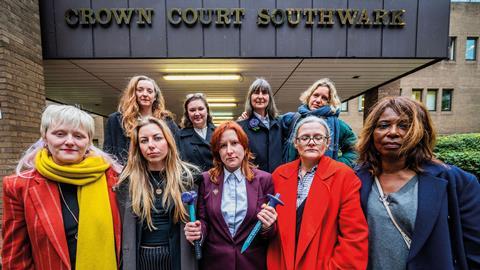Nine climate protesters (pictured) were cleared by a jury last month of causing criminal damage at the headquarters of HSBC in London. The court was told they used hammers and chisels to shatter plate-glass windows in April 2021. Replacing the custom-made panels was said to have cost £500,000.

Section 1 of the Criminal Damage Act 1971 makes it an offence to destroy or damage someone else’s property ‘without lawful excuse’. You have such an excuse if you believe that the people who could give their consent to the damage – generally, the property’s owners – ‘would have so consented to it if… they had known of the… damage and its circumstances’. So, for example, it would be lawful to smash the window of a parked car, or a house, if people inside were in danger.
Sally Hobson, prosecuting in the HSBC case, told jurors that the defendants were guilty of unlawful conduct. ‘We say that, whatever the purpose behind them causing the damage, there was no lawful excuse for doing so.’ That was not, we may infer, how the jury saw it.
Last year, four defendants were cleared of criminal damage after a statue of Edward Colston was thrown into Bristol harbour. Following an acquittal, the attorney general may ask the Court of Appeal to give its opinion on a point of law that has arisen in the trial – though the verdict remains unaffected. In the Colston case, appeal judges concluded that the human rights convention ‘does not provide protection to those who cause criminal damage during protest which is violent or not peaceful’.
But do you have a lawful excuse if you honestly believe that the ultimate owners of a building would consent to it being damaged as part of a protest, however misguided your belief may be? I think it would be useful to know what the appeal courts think about that too. But perhaps it makes no difference if the jury can ignore the judge’s directions.
Jurors ‘should obey the law’, Lord Devlin said in his 1956 Hamlyn lectures. ‘But it is an obedience which they cannot be compelled to give. They are wardens of their own conscience and are answerable to their own conscience, so no man can be convicted against the conscience of the jury.’
That view was cited with approval in 2011 by Lord Justice Thomas. ‘The long-established system of jury trial in England and Wales permits a jury to acquit where, on the evidence presented to it, the logical consequence should be that the jury should convict,’ the future lord chief justice said.
John Spencer KC (hon), emeritus professor of law at Cambridge, has written about this in the latest Archbold Review. What, he asks, is the status of the jury’s power to acquit in defiance of the law? Is ‘jury equity’, as he calls it, a valuable constitutional safeguard? Or is it an embarrassing anomaly, like the immunity from prosecution enjoyed until 1991 by a husband who raped his wife?
In a report to the lord chancellor on the criminal courts in 2001, a leading appeal judge said he regarded the ability of jurors to acquit regardless of the law as ‘a blatant affront to the legal process’. Sir Robin Auld recommended that ‘the law should be declared, by statute if need be, that juries have no right to acquit in defiance of the law or in disregard of the evidence’.
That never happened. In 2015, a panel of law lords led by Lord Bingham held that ‘there are no circumstances in which a judge is entitled to direct a jury to return a verdict of guilty’. That was in a case called Wang.
In Spencer’s view, the Crown court seems to operate on the basis that the power to acquit in defiance of the evidence is an embarrassing anomaly. Jurors are not told about that power, either during their induction or by the judge. ‘For defence counsel to… tell the jury it can acquit the defendant in disregard of the judge’s directions on the law would be viewed as a breach of the bar’s code of conduct,’ Spencer writes. ‘So a defendant who wishes to secure an acquittal by these means will have to conduct their defence in person.’
Can courts order unrepresented defendants not to mention the causes their protests are intended to advance? That question may be decided by the Court of Appeal. But Spencer believes that defendants should be allowed a limited amount of time to explain themselves. He also argues that juries should no longer swear to ‘give a true verdict according to the evidence’.
I disagree. Jurors should still be told that it is for them to decide whether a charge is proved. But they must do so on the law and evidence, regardless of the defendant’s motives.
joshua@rozenberg.net
































12 Readers' comments